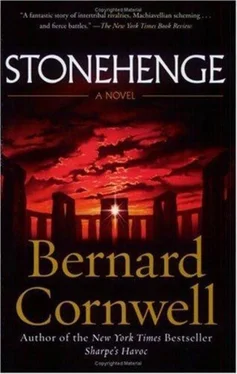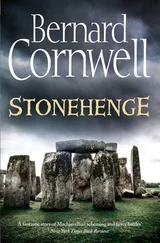In the winter's heart, when Slaol was at his weakest and Lahanna was shining brightly on Cathallo's shrine to touch the boulders with a sheen of glistening cold light, Sannas brought two warriors to the temple. 'It is time,' she told Camaban.
The warriors laid Camaban on his back beside one of the temple's taller stones. One man held Camaban's shoulders, while the other held the crippled foot towards the full moon. 'I will either kill you,' Sannas said, 'or cure you.' She held a maul of stone and a blade that had been made from the scapula of a dead man and she laid the bone blade on the grotesquely curled ball of Camaban's foot. 'It will hurt,' she said, then laughed as if Camaban's pain would give her pleasure.
The warrior holding the foot flinched as the maul hammered on the bone. Sannas hammered again, showing a remarkable strength for such an old woman. Blood, black in the moonlight, was pouring from the foot, soaking the warrior's hands and running down Camaban's leg. Sannas beat the maul on the blade again, then wrenched the scapula free and gritted her teeth as she forced the curl of Camaban's clenched foot outwards. 'You have toes!' she marvelled, and the two warriors shuddered and turned away as they heard the cracking of cartilage, the splintering of bone and the grating of the broken being straightened. 'Lahanna!' Sannas cried, and hammered the blade into Camaban's foot again, forcing its sharpened edge into another tight part of the bulbous flesh and fused bone.
Sannas bent the foot flat, then splinted it in deer bones that she bound tight with strips of wolfskin. 'I have used bone to mend bone,' she told Camaban, 'and you will either die or you will walk.'
Camaban stared at her, but said nothing. The pain had been more than he had ever expected, it had been a pain fit to fill the whole wide moonlit world, but he had not whimpered once. There were tears in his eyes, but he had made no sound and he knew he would not die. He would live because Slaol wanted it. Because he had been chosen. Because he was the crooked child who had been sent to make the world straight. He was Camaban.
Winter passed. The salmon returned to the river and the rooks to the high elms that grew west of Ratharryn. The cuckoo called and dragonflies darted where winter ice had locked the river. Lambs bleated among the ancestors' grave mounds, and herons feasted on ducklings in Mai's river. The blackbird's song rippled across the woods where, when spring was full, the deer lost their grey winter coats and shed their antlers. Hengall's father had once claimed to have seen deer eating their old antlers, but in truth it was Syrax, the stag god who roamed the woods, who took them back to himself. The shed antlers were prized as tools, and so men sought to find them before Syrax.
The fields were ploughed. The wealthier folk tugged the fire-hardened plough stake behind an ox, while others used their families to drag the gouging point across the soil. They broke the ground from east to west, then north to south before the priests came to scatter the first handfuls of seed. The previous harvest had been bad, but Hengall had hoarded seed in his hut and now he released it for the fields. Some fields were abandoned to grass, for their soil was tired, but the previous spring the men had ringed trees on the forest's edge, then burned the dead trees in the autumn, and the newly cleared land was ploughed and sown while the women made a sacrifice of a lamb. Kestrels floated above the Old Temple where orchids flowered and blue-winged butterflies flew.
In summer, just when the thrushes fell silent, the boys of Hengall's tribe faced their ordeals of manhood. Not every boy passed the ordeals and some did not even survive them. Indeed it was better, the tribe said, for a boy to die than to fail because in failure they risked ridicule for the rest of their lives. For a whole moon after the ordeal a boy who failed would be forced to wear a woman's clothes and toil at woman's work and squat like a woman to pass water. And for the rest of his life he could not take a wife, nor own slaves, cattle or pigs. A few of those who failed might display some talent for augury and dreams, and those boys might become priests and would then receive the privileges of those who had passed the ordeals, but most of those who failed were scorned for ever. It was better to die.
'You're ready?' Hengall asked Saban on the morning of the first day.
'Yes, father,' Saban said nervously. He was not sure that was true, for how could anyone prepare to be hunted by Jegar and his hounds? In truth Saban was terrified, but he dared not show his fear to his father.
Hengall, whose hair had turned grey in the previous winter, had summoned Saban to give the boy a meal. 'Bear meat,' Hengall said, 'to give you strength.'
Saban had no appetite, but he ate dutifully and Hengall watched each mouthful. 'I have been unlucky in my sons,' he said after a while. Saban, his mouth full of the pungent flesh, said nothing, and Hengall groaned as he thought of Lengar and Camaban. 'But in you I have a proper son,' he said to Saban. 'Prove it in these next days.'
Saban nodded.
'If I died tomorrow,' Hengall growled, touching his groin to avert the ill luck implied in the words, 'I suppose Galeth would become chief, but he wouldn't be a good leader. He's a good man, but too trusting. He would believe everything Cathallo tells us, and they lie to us as often as they speak the truth. They claim to be our friend these days, but they would still like to swallow us up. They want our land. They want our river. They want our food, but they fear the price they'd pay. They know we would maul them grievously, so when you become chief you must have proved yourself a warrior whom they would fear to fight, but you must also be wise enough to know when not to fight.'
'Yes, father,' Saban said. He had hardly heard a word for he was thinking about Jegar and his long-haired dogs with their tongues lolling between sharp teeth.
'Cathallo must fear you,' Hengall said, 'as they fear me.'
'Yes, father,' Saban said. His chin was dripping with bear's blood. He felt sick.
'The ancestors are watching you,' Hengall went on, 'so make them proud of us. And once you're a man we shall marry you to Derrewyn. We'll make it the first ceremony of the new temple, eh? That should bring you Slaol's favour.'
'I like Derrewyn,' Saban said, blushing.
'Doesn't matter whether you like her or hate her, you just have to give her sons, a lot of sons. Wear the girl out! Breed her, then breed other women, but make yourself sons! Blood is all.'
With these injunctions fresh in his ears, and with his gullet sour from the rank taste of the bear, Saban went to Slaol's temple just beyond the settlement's entrance. He was naked, as were the twenty-one other boys who gathered beneath the high temple poles. All the boys would now have to go into the wild woods for five nights and there survive even though they were being hunted, and the hunters, who were the men of the tribe, surrounded the temple and jeered at the candidates. The hunters all carried bows or spears and they called the boys woman-hearted, said they would fail, and warned them that the ghouls and spirits and beasts of the woods would rend them. The men invited the boys to abandon the quest before they began, saying that there was small point in their attempting to become men for they were so obviously puny and feeble.
Gilan, the high priest, ignored the jeers and taunts as he prayed to the god. The small chalk balls that were the symbols of the boys' lives were laid in the temple's centre, above the grave of a child who had been sacrificed to the god at the temple's consecration. The balls would stay there until the end, when those who became men would be allowed to break them and those who failed would have to return the chalk symbols to their shamed families.
Читать дальше
Конец ознакомительного отрывка
Купить книгу












